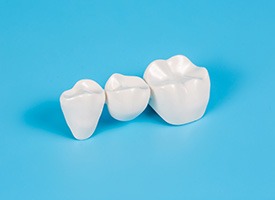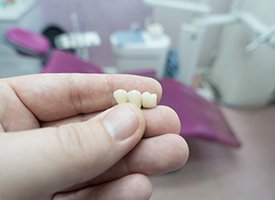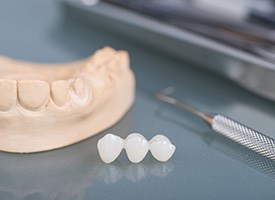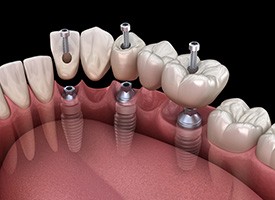Dental Bridges – Pittsburgh, PA
Saying Goodbye to Smile Gaps
It should go without saying that losing a tooth isn’t a good thing. In this situation, you’ll likely suffer harm to your looks, oral health, and quality of life. That means losing adjacent teeth – those that were side-by-side – is an even worse problem to face. Thankfully, you can always rely on Advanced Dental Solutions for dental bridges in Pittsburgh! Just keep reading to learn more about these prosthetics, or book a consultation soon.
What is a Dental Bridge?

A dental bridge (like a denture or dental implant) is a special oral device. By fusing materials to either side of an artificial tooth, it can replace one to four missing adjacent teeth. The result is that a bridge can often “fill” large smile gaps quickly.
Given these facts, the best candidates for dental bridges have lost adjacent teeth. These patients benefit the most from care; a bridge treatment can restore their smile in one go. Still, note that qualifying for dental bridges isn’t hard; most adults with fair oral health can get one.
The Types of Dental Bridges

Before you actually get a dental bridge, our dentists will assess your smile. This exam lets them see how (or if) to tailor your treatment plan, ensuring you get quality results. They’ll use its feedback to suggest you get one of the following dental bridges:
Traditional Dental Bridge

The traditional dental bridge (per its name) is the kind used most by today’s dentists. In terms of design, it’s made of dental crowns fused to either side of a pontic (i.e., an artificial tooth). This makeup means a regular bridge must use nearby natural teeth or “abutments” to stay secure.
Overall, a major upside to the traditional bridge is that it doesn’t cost much; Its materials aren’t that rare. The downside is that a dentist must remove enamel to place a traditional bridge.
Implant Bridge

Unlike a regular one, an implant bridge uses dental implants – metal posts placed in your jawbone. These smaller restorations fuse with your jaw to keep the larger device stable and secure. In other words, an implant bridge’s implants stop it from falling or coming loose.
The largest benefit of implant bridges is that they don’t alter existing teeth. Since they rely on dental implants, a dentist doesn’t have to “prep” abutments to place them. The negative part is that implant bridges can be a tad expensive.
The Benefits of Getting a Dental Bridge

With our office’s dental bridges, you’ll enjoy:
- Great Oral Health – By “filling” your smile gaps, a dental bridge stops harmful bacteria from spreading in your mouth. This effect reduces your risk of tooth decay, gum disease, and worse.
- A Gorgeous Grin – Dental bridges (traditional or not) blend with your smile due to their porcelain surfaces. Their material makes them look very lifelike, so your results should turn out great.
- Easier Eating – Because a dental bridge provides teeth, it can help you chew many foods more easily.
- Long-Lasting Effects – An average dental bridge lasts 5-15 years, while well-maintained ones can keep working for 20 years or more.
Rather than live with gaps in your grin, try dental bridges in Pittsburgh. You and your smile won’t regret that choice!
Dental Bridges FAQs
Can You Take a Dental Bridge Out?
Dental bridges are durable restorations that are not designed to be removed without the help of a trained dental professional, so you should not be able to take your appliance out of your mouth on your own. While some healthcare providers refer to partial dentures as “removable bridges,” this term is not entirely accurate since partials are designed to be removed by the patient at any time. A dental bridge can remain functional in its place for up to fifteen years if it receives excellent care.
Is Getting a Dental Bridge Painful?
We only place dental bridges after our patients have a consultation with one of our dentists, and the process of receiving one begins with administering an appropriate anesthetic to ensure that the procedure is painless. If you need extra help sitting calmly and comfortably, you may also receive dental sedation treatment. If you are receiving a traditional bridge, you will probably experience some soreness in the natural teeth supporting the appliance for a few days afterward, but this should fade over time and be easy to manage with over-the-counter pain medication. However, contact our office if the pain seems to be getting worse after a few days. Since restoring a lost tooth can help prevent the remaining teeth from drifting out of place, a dental bridge can prevent discomfort resulting from misalignment later on. If you are receiving an implant bridge, you can expect some soreness in your jaw after the procedure, but we’ll be sure to provide you with post-operative instructions to help you stay comfortable.
How Many Teeth Can a Dental Bridge Replace?
A dental bridge can replace anywhere from one to four sequential missing teeth, but they are usually used to restore one or two since longer bridges are less stable. It may be especially risky to replace three or more teeth with a bridge if the natural teeth supporting it are not strong and healthy. However, using dental implants to secure your bridge can significantly lower this risk since implants are much sturdier than dental crowns.
Can Dental Bridges Get Cavities?
While it’s impossible for the artificial teeth of a dental bridge to develop cavities, the natural teeth supporting the appliance still can. This problem may become significantly more likely if food residue becomes trapped beneath the restoration or between its teeth, leading to accumulations of harmful oral bacteria. If the natural teeth supporting a bridge become decayed, it may be necessary to remove and possibly replace the appliance so the infection can be eliminated. If a bridge is old, cracks that can house infectious bacteria may also form in the cement holding the appliance in place. The best way to keep your appliance and the natural teeth supporting it in great shape is to practice excellent oral hygiene and dental bridge maintenance every day.
